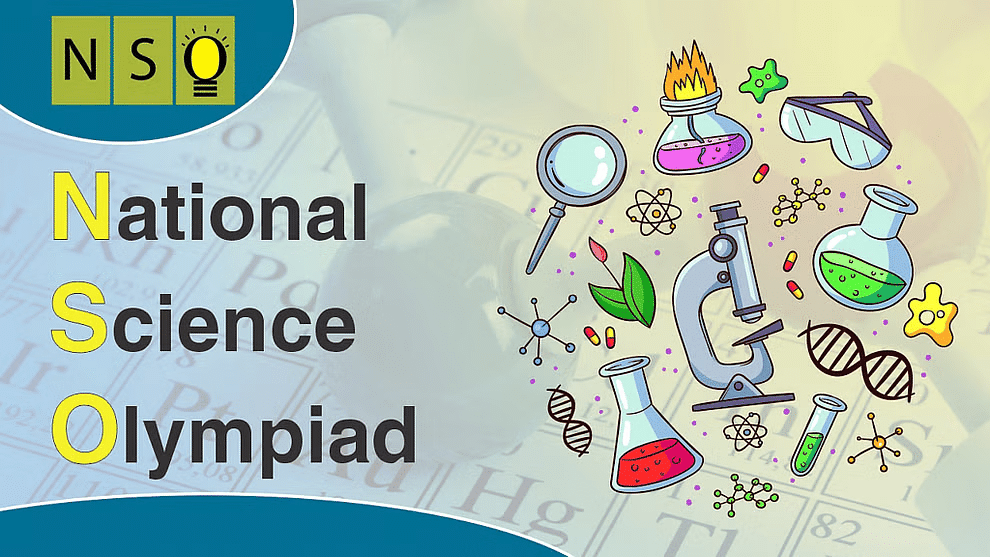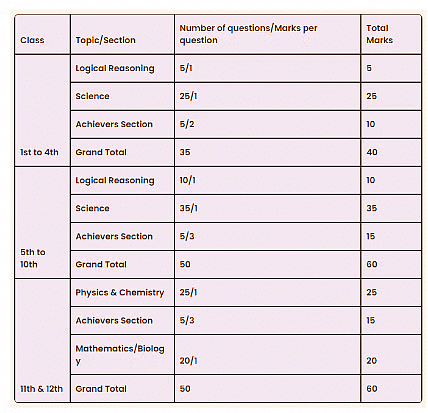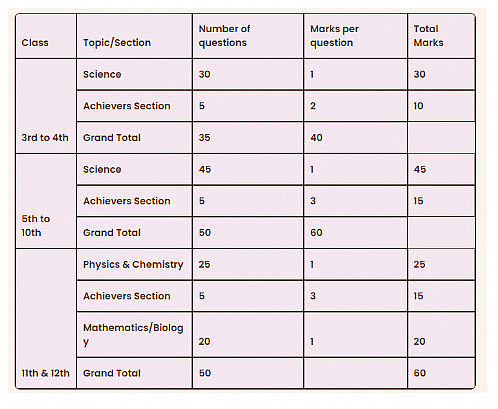How to Participate in Science Olympiad | Science Olympiad Class 9 PDF Download
| Table of contents |

|
| What is NSO? |

|
| Steps to participate in NSO |

|
| Exam Pattern and Syllabus |

|
| Benefits |

|
| Preparation Tips and Tricks |

|
What is NSO?
The National Science Olympiad (NSO) is an exciting competition arranged by the Science Olympiad Foundation (SOF) for students from grades 1 to 10. It's all about learning numbers and logical skills while having fun. The competition gives students a chance to grow their confidence and become better at building logics and have a good understanding of solving hard and complex problems.

NSO 2025-2026 Eligibility Criteria:
- The Science Olympiad Foundation (SOF) mandates that schools register their students for participation.
- Schools not yet registered can complete the registration process by sending an email to the SOF.
- Eligibility for the NSO is limited to pupils in grades 1 through 10.
- Application forms must be completed and submitted solely through the student's respective school; individual applications are not accepted by the Science Olympiad Foundation.
- Mathematics is compulsory subjects for all students intending to participate.
- Participation in the examination is restricted to students from recognized boards such as CBSE, ICSE, and state boards.
Steps to participate in NSO
To take part, students simply need to follow these simple instructions:
Accessing Registration forms:
- Students in classes 1 to 10 are eligible to participate in the SOF NSO.
- Registration forms are given to all the schools that are already part of SOF.
- Schools not yet registered can request prospectuses by emailing info@sofworld.org or making a phone call.
Completing and Returning Forms:
- After all the students have submitted their forms, schools are required to return the registration forms to SOF, completely filled out and in good order, by the specified deadline.
Roll Numbers:
- The school's coordinating teacher is responsible for completing the School Registration Form (SRF) and Students' Registration Sheet (SRS) following the provided guidelines.
- These forms should be sent to SOF's office before the designated submission deadline.
- Upon receipt of the Students' Registration Sheet (SRS) from the school, SOF will register the school and students.
- SOF will then generate roll numbers for all participating students.
Registration Fee Details:
- Schools in India, Bangladesh, Bhutan, & Nepal pay a registration fee of Rs 125* (including GST) per student/Olympiad to SOF for the examination.
- An extra charge of Rs 25** per student may be added by schools for in-charge honorarium, teacher remuneration, and other expenses.
- For countries outside India, Bangladesh, Bhutan, & Nepal, the registration fee is US$9 per student/Olympiad*, with an additional US$1** per student for related expenses.
- *Includes GST.
- **Additional charge for related expenses.
Fee Exemption:
- Students with major physical disabilities or Indian students whose parent was martyred during defense operations are exempt from fees.
No Individual Registrations:
- It's important to note that individual student registrations are not accepted. Students should register through their respective schools to participate in the NSO.
Exam Pattern and Syllabus
Pattern
- The NSO exam comprises three stages for students.
- Section I covers Logical Reasoning for grades 6 to 12.
- Section II focuses on Basic Science Fundamentals.
- Section III emphasizes high-order thinking questions, with difficulty increasing across grades.
- The question paper includes 35 objective-type questions for Classes 1 to 4 and 50 for Classes 5 to 10.
- Duration: Students have 60 minutes to complete it.
Marking Scheme:
The exam pattern and the marking scheme has been outlined in the table below:
NSO Class 9 Level 1 Exam Pattern:

NSO Class 9 Level 2 Exam Pattern:

Note:
- Questions of level-I Olympiad exams will be 60% from the current class syllabus and 40% from the previous class syllabus, e.g. Class-7 NSO exam will have 60% questions from class-7 syllabus and 40% questions from class 6 syllabus.
- Questions of level-II Olympiad exams will be from current class syllabus only.
- Questions in ACHIEVERS SECTION will be from current class syllabus only.
Syllabus
- Logical Reasoning (Section - 1): Series Completion and Inserting, Analogy and Classification, Coding-Decoding , Blood Relations, Direction Sense Test, Logical Venn Diagrams, Alpha-Numeric Sequence Puzzle, Mathematical Operations, Mirror and Water Images, Paper Folding and Paper Cutting, Cubes and Dice, Dot Situation, Essential Element, Embedded Figure, Odd One Out, Patterns.
- Science Section (Section - 2): Chemical Reactions and Equations, Acids, Bases and Salts, Metals and Non-metals, Carbon and Its Compounds, Life Processes, Control and Coordination, Reproduction in Organisms, Heredity, Light-Reflection and Refraction, Human Eye and Colourful World, Electricity, Magnetic Effects of Electric Current, Our Environment and Its Management.
- Achiever's Section (Section 3): This section may contain questions that are more challenging and are designed to assess a student's deeper comprehension of scientific principles. The syllabus is as per Section – 2 .
Benefits

- Enhanced Problem-Solving Skills: Science Olympiads challenge students to think critically and solve complex problems, improving their analytical and logical reasoning abilities.
- Deepened Understanding of Science Concepts: Preparation for Olympiads often requires a deeper and broader understanding of science concepts than standard curricula, fostering a more profound comprehension of the subject.
- Increased Academic Performance: The skills and knowledge gained from Olympiad preparation can lead to better performance in school mathematics and other related subjects.
- Preparation for Higher Education: Participation in Olympiads can be a valuable experience for students planning to pursue STEM fields in college, providing them with a strong foundation in advanced mathematics.
- Networking Opportunities: Olympiads often bring together like-minded students, allowing participants to network with peers, mentors, and professionals in the field of mathematics.
- International Exposure: Many Olympiads, such as the Olympiad (NSO), provide National Science opportunities for international travel and cultural exchange, broadening students' horizons.
- Improved Self-Confidence: Successfully solving challenging problems and competing in Olympiads can boost a student’s confidence in their mathematical abilities and overall academic skills.
- Enhanced Time Management: Preparing for Olympiads requires effective time management and organizational skills, which are beneficial in all areas of life.
These benefits, along with the intellectual growth and personal development that come from participating in Olympiad competitions, make them highly rewarding experiences for students.
Preparation Tips and Tricks
Preparing for the Class 10 Science Olympiad may seem difficult, but it's an exciting chance. Instead of just a test, view it as an adventure to discover the world of numbers and logic. With enthusiasm and dedication, you can approach it successfully, enjoying the process of learning and solving problems.
To support you on this journey, we've prepared some useful tips and tricks:
Preparation:
- Understand the syllabus thoroughly and plan to cover topics each day.
- Choose a consistent time and place for studying to maintain regularity.
- Focus on learning with a clear conceptual understanding.
- Take notes while studying, highlighting key points and important topics for easier revision.
- After completing the syllabus, practice chapter-wise questions and mock tests to identify strengths and weaknesses and improve accordingly.
- Once confident with the syllabus, solve previous year's question papers to understand the exam pattern, enhance time management skills, and improve speed and accuracy.
Exam Strategies:
- Stay calm and focused. Take deep breaths and read instructions carefully.
- Effective time management. Allocate time for each section based on strengths and question numbers.
- Careful reading. Analyze questions before attempting answers and identify keywords.
- Utilize the elimination technique. Eliminate wrong options if uncertain about an answer.
- Double-check. Review answers to avoid mistakes before submitting.
Bonus Tips:
- Stay curious! Experiment, ask questions, and explore the world of numbers and logic.
- Make Mathematics fun by using digital whiteboards and interactive problem-solving platforms, calculating distances, travel time, and costs for trips.
- Believe in yourself. Have confidence in your preparation and give your best effort.
Remember:
- NSO is challenging yet rewarding; focus on learning and enjoying the journey.
- Celebrate achievements, learn from mistakes, and keep your passion alive.
|
28 videos|115 docs|52 tests
|
FAQs on How to Participate in Science Olympiad - Science Olympiad Class 9
| 1. What is NSO and who can participate? |  |
| 2. What are the steps to participate in NSO? |  |
| 3. What is the exam pattern and syllabus for NSO? |  |
| 4. What are the benefits of participating in NSO? |  |
| 5. What are some preparation tips for NSO? |  |




















